Virtual Reality Seniors: Unlocking the Benefits
Virtual reality technology is becoming increasingly accessible and beneficial for seniors, allowing them to experience a whole new world of immersive and engaging experiences. So, what are the benefits of embracing virtual reality seniors, and how can it enhance their lives?

In recent years, virtual reality (VR) has emerged as a revolutionary tool for entertainment, education, and even healthcare. But did you know that it’s also making a significant impact on the lives of older adults? That’s right – virtual reality technology is becoming increasingly accessible and beneficial for seniors, allowing them to experience a whole new world of immersive and engaging experiences. So, what are the benefits of embracing virtual reality seniors, and how can it enhance their lives?
In this blog post, we’ll explore the various aspects of VR for seniors, from the headsets and getting started to the types of experiences available and the role of virtual reality in senior living communities. We’ll also discuss the mental health benefits of VR technology and delve into the ongoing clinical research and emerging trends in this exciting field. So, strap on your VR headset and let’s dive into the fascinating world of virtual reality seniors!
Key Takeaways
- Seniors are embracing virtual reality technology to combat loneliness, cognitive decline and other age-related issues.
- VR headsets for seniors range from high end brands to affordable Google Cardboard, allowing them to experience the virtual world.
- Virtual Reality offers stimulating experiences that help reduce social isolation and improve mental health of seniors in living communities through immersive activities & specialized therapy sessions.
Embracing Virtual Reality for Seniors
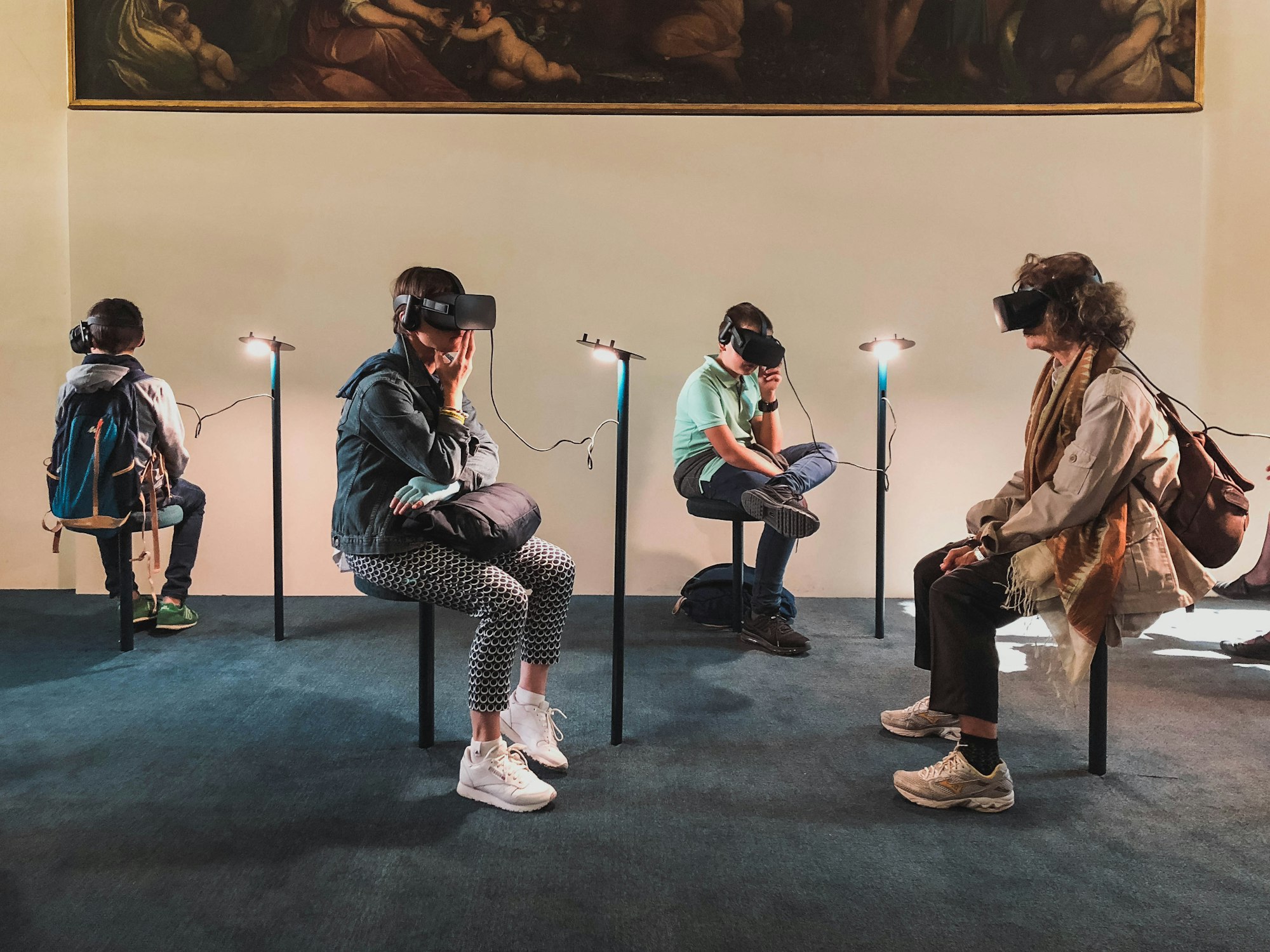
Virtual reality technology has come a long way in recent years, making it more accessible and appealing to a wide range of users, including older adults. With the right equipment and applications, seniors can enjoy immersive virtual reality experiences that not only entertain but also help combat loneliness and isolation.
Companies like MyndVR and Rendever are specifically focusing on providing VR experiences for seniors, aiming to help with cognitive decline and other age-related issues. These initiatives, along with the growing popularity of VR technology among seniors, are paving the way for a whole new world of engaging and stimulating experiences that can significantly improve their quality of life.
VR Headsets for Seniors
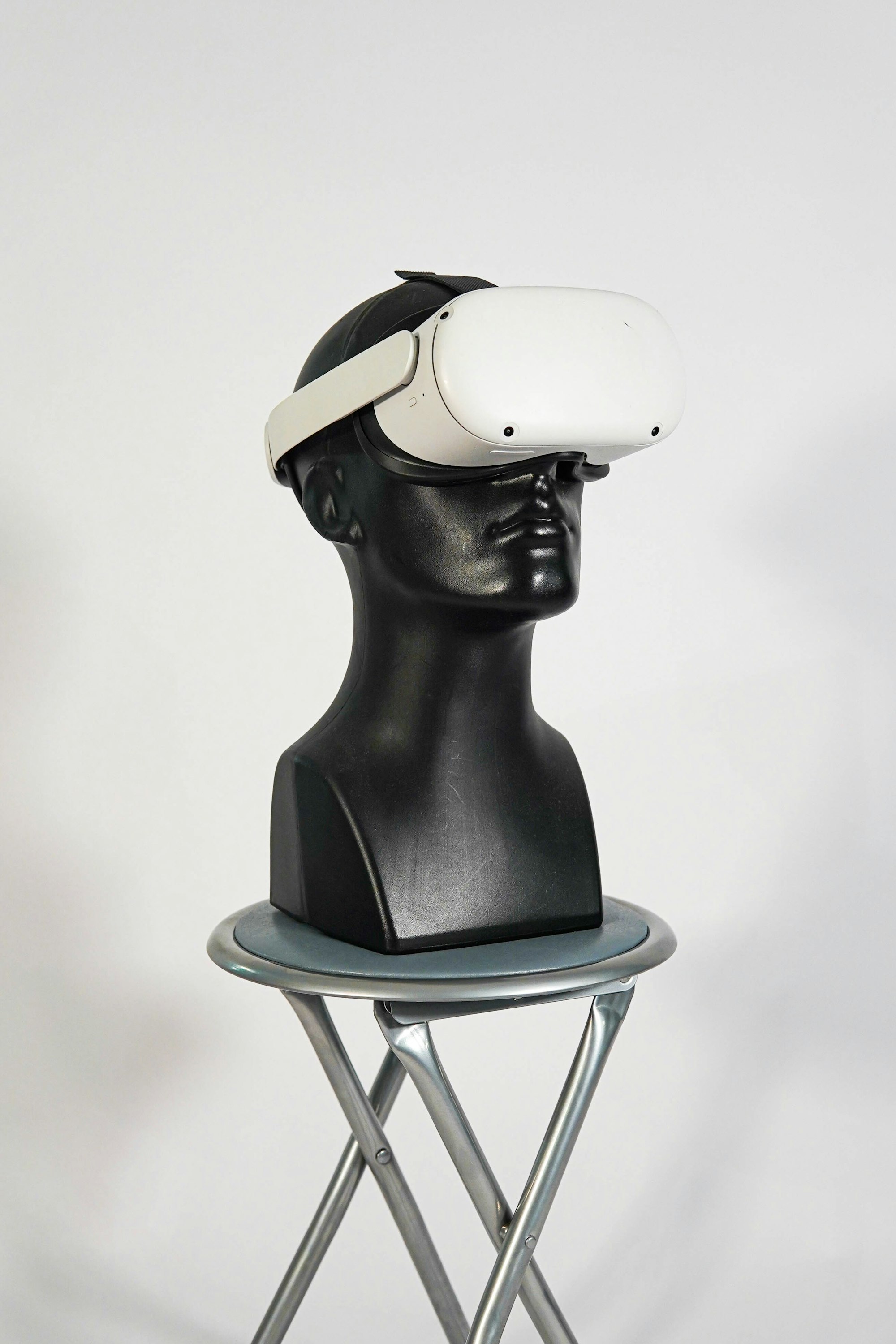
A variety of VR headsets suitable for seniors are available in the market, each catering to different needs and budgets. Popular brands like Meta Quest and Sony PlayStation offer high-quality headsets that have been well-received by seniors and are suitable for reminiscence therapy.
For those on a tighter budget, there’s Google Cardboard – a low-cost VR headset option that works with smartphones. This affordable alternative allows seniors in retirement communities to try out VR without breaking the bank. Setting up Google Cardboard is a breeze, requiring just a few minutes of assembly before seniors can dive into the virtual world.
Getting Started with VR
To embark on the virtual reality journey, seniors should:
- Select a suitable headset considering factors such as display resolution, field of view, refresh rate, audio quality, comfort level, and cost.
- Connect the headset to a compatible device, such as a computer or console.
- Download the necessary software.
With everything set up, seniors can start exploring suitable applications, such as virtual travel and exploration, fitness and wellness, and social connection apps, for an enjoyable and beneficial VR experience.
Virtual Reality Experiences for Older Adults
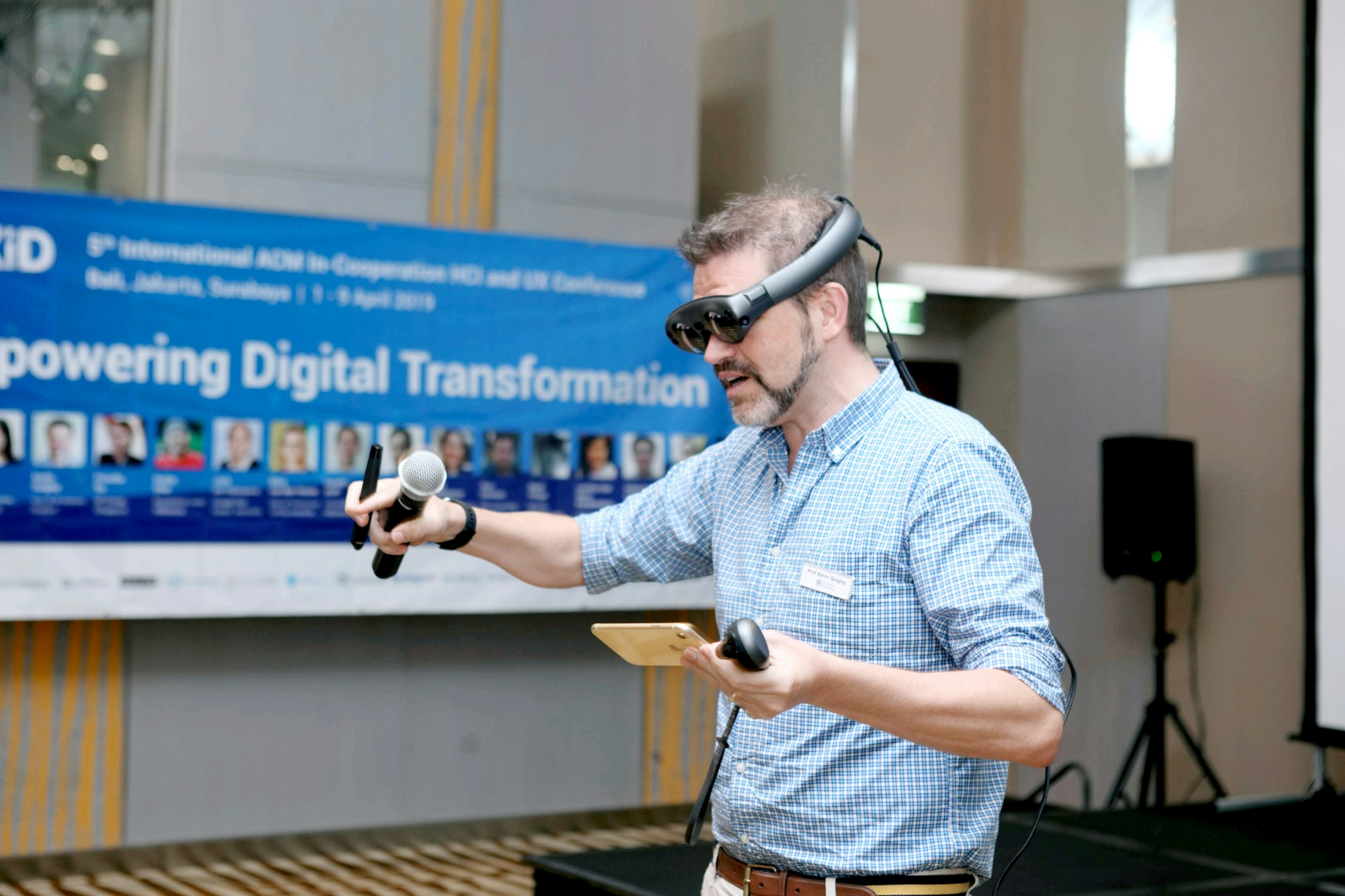
The realm of virtual reality presents a broad spectrum of experiences, including a tailored virtual reality experience to meet the preferences and needs of older adults. From traveling the world to engaging in fitness activities and connecting with loved ones, there’s something for everyone in the realm of virtual reality.
Whether it’s exploring the wonders of the world or participating in a fun workout, VR experiences for seniors are designed to be engaging, immersive, and enjoyable. We will now examine some of the highly favored virtual reality experiences among older adults.
Travel and Exploration
Who wouldn’t love to explore the world without leaving the comfort of their childhood home? With travel and exploration apps like Wander and National Geographic VR, seniors can virtually visit different destinations and experience various cultures, all from the safety and convenience of their living room.
These virtual reality experiences are not only entertaining but can also help seniors with limited mobility to access and explore new places they may never have had the chance to visit in person. From the bustling streets of Paris to the serene landscapes of the Grand Canyon, the world is just a headset away.
Fitness and Wellness
Maintaining fitness and health is crucial across all ages, and virtual reality provides a distinctive platform for seniors to partake in wellness activities. Apps like Zen Zone provide relaxation experiences, such as guided meditation and relaxation techniques, promoting mental and physical well-being for seniors.
In addition to relaxation, there are various VR exercise games and apps specifically designed to cater to the fitness needs of older adults. Some examples include:
- Alcove
- RendeverFit
- Beat Saber
- BoxVR
- Superhot VR
- YUR.fit
- OhShape
At Maplewood Senior Living, seniors are encouraged to maintain an active and healthy lifestyle through meaningful social engagement, while having fun in these engaging and enjoyable experiences.
Social Connection
One of the biggest challenges faced by seniors is the risk of social isolation and loneliness. Virtual reality can significantly aid older adults in maintaining connections with friends and family, despite physical distances. Social connection apps like Alcove allow seniors to interact with their loved ones in a virtual environment, fostering meaningful connections and combating feelings of loneliness.
With a VR headset, seniors can participate in shared experiences with family members, such as watching movies, playing games, or even attending family events. These virtual encounters not only provide entertainment but also create lasting memories that contribute to the overall well-being of older adults.
Mental Health Benefits of Virtual Reality for Seniors
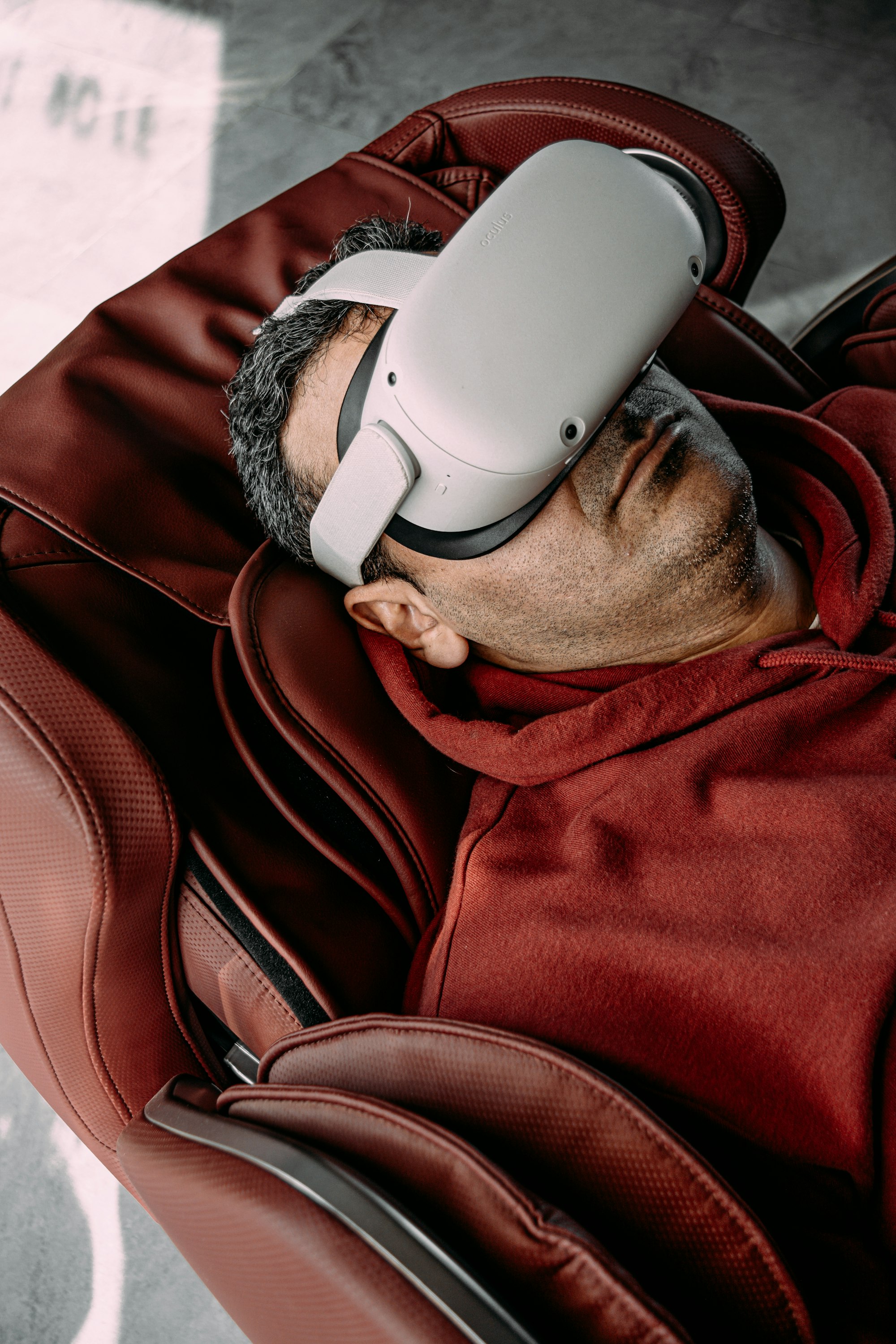
Virtual reality has been proven to offer numerous mental health benefits for seniors, from reducing social isolation to supporting cognitive function. By providing engaging and immersive experiences, VR technology can help enhance the overall well-being of older adults.
We will now discuss the principal mental health benefits virtual reality can offer seniors, including its role in decreasing social isolation and bolstering cognitive function.
Reducing Social Isolation
Social isolation can have a detrimental impact on the mental health of seniors. Virtual reality can serve as a powerful tool in combating loneliness and isolation by providing opportunities for social interaction and connection.
Through virtual reality experiences, seniors can connect with others in a shared virtual space, engaging in activities and conversations that foster a sense of belonging and camaraderie. By offering an alternative form of social interaction, VR technology helps seniors stay connected with their loved ones and maintain a healthy social life.
Supporting Cognitive Function
Cognitive decline is a common concern among older adults, but virtual reality can help support cognitive function by offering stimulating activities and immersive environments that challenge the mind. These engaging experiences can help strengthen neural connectors that support sensory, motor, and cognitive skills, ultimately improving cognition in seniors.
From memory games to problem-solving activities, virtual reality experiences can be tailored to meet the cognitive needs of seniors, ensuring a mentally stimulating and enjoyable experience. By providing a unique platform for mental engagement, VR technology can play a vital role in promoting cognitive health among older adults.
Virtual Reality in Senior Living Communities
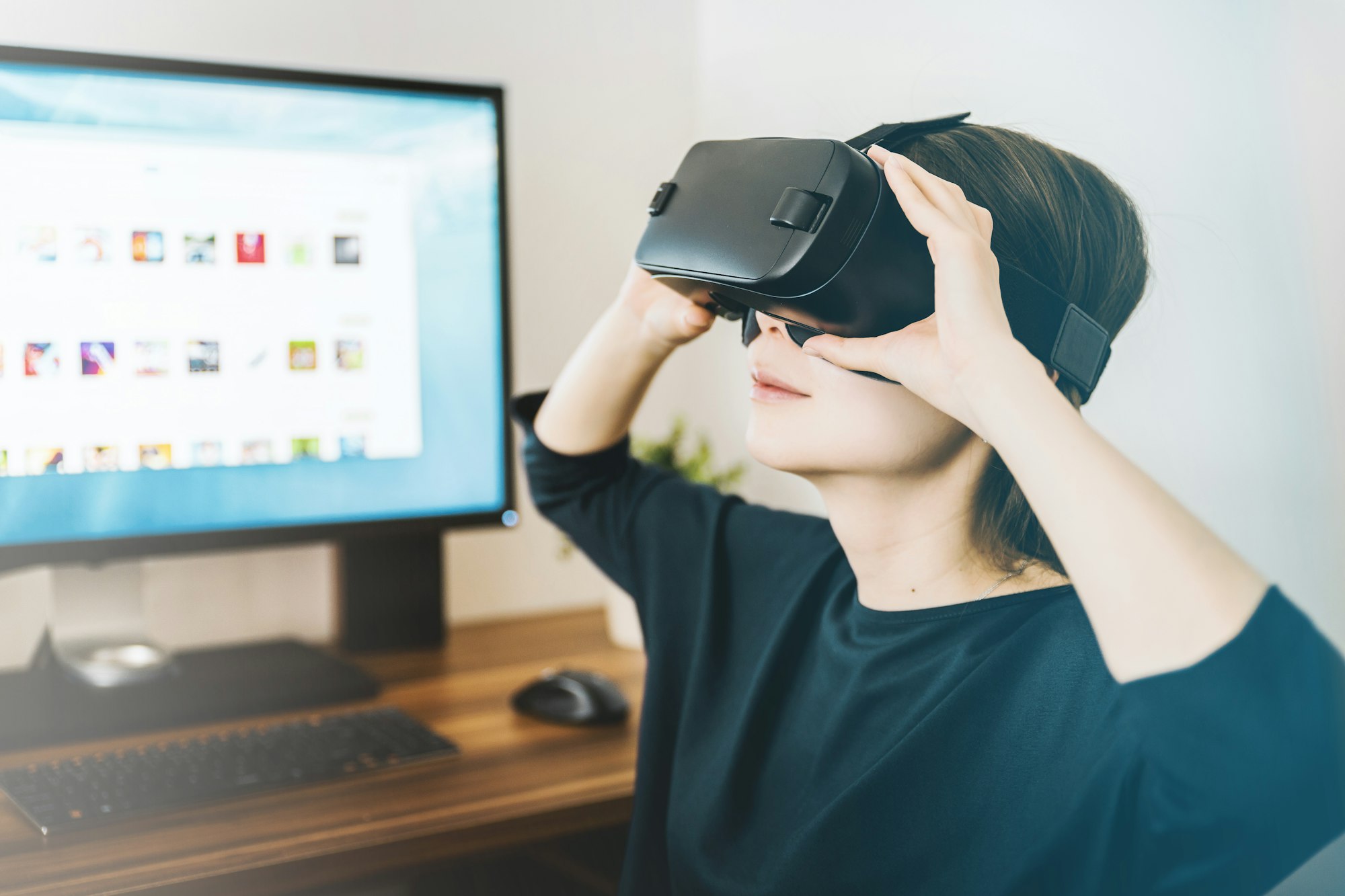
The integration of virtual reality in senior living communities and living facilities is becoming increasingly popular, offering a wide range of benefits to residents and caregivers alike. Some of the benefits include:
- Enhanced daily activities
- Specialized therapy sessions
- Improved cognitive function
- Increased social engagement
- Reduced feelings of isolation and loneliness
Virtual reality technology can truly enhance the quality of life for seniors in these communities, thanks to virtual reality’s ability to provide immersive experiences.
We will now delve into the role of virtual reality in senior living communities, highlighting its integration into everyday activities and the significance of caregiver training and support.
Integrating VR into Daily Activities
Integrating virtual reality into daily activities within senior living communities can offer residents engaging and stimulating experiences that promote social interaction and mental stimulation. Platforms like Rendever and MyndVR provide a wide range of VR experiences designed specifically for seniors, allowing them to participate in therapy sessions, rent equipment, and engage in immersive activities.
These virtual reality experiences not only provide entertainment but also contribute to the overall well-being of seniors, improving mental health, increasing social interaction, and enhancing cognitive function. By incorporating VR technology into daily routines, senior living communities can offer a unique and enjoyable experience for their residents.
Training and Support for Caregivers
To fully harness the benefits of virtual reality in senior living communities, it is imperative that caregivers are adequately trained and supported in using this technology. Programs that offer valuable virtual reality training for caregivers include:
- The CARERS program
- Santa Clara University
- Care Indeed
- UC Collaborates with the Council on Aging
These programs equip caregivers with the necessary knowledge and skills to safely and effectively use VR technology with seniors.
Proper training and support ensure that caregivers can provide seniors with the best possible experience with virtual reality technology while mitigating potential risks and challenges associated with its use. A well-prepared caregiver can maximize the benefits of VR technology, greatly enhancing the quality of life for seniors in their care.
Clinical Research and VR's Future in Senior Care

As the field of virtual reality continues to evolve and expand, ongoing clinical research and partnerships are crucial in exploring the potential benefits and emerging technology trends for seniors. Companies like MyndVR are dedicated to researching the therapeutic effects of VR on older adults and are collaborating with university and private-sector researchers to further investigate this area of study.
We will now examine the research partners investigating the impact of virtual reality on age-related conditions, along with the emerging technology trends that are shaping VR’s future in senior care.
MyndVR Research Partners
MyndVR has established a research coalition consisting of university and private-sector researchers, as well as the Virtual Human Interaction Lab at Stanford University. These research partners collaborate on studies to investigate the impact of virtual reality on age-related conditions and overall well-being in seniors.
By working together, they aim to uncover new insights and potential applications for virtual reality technology in improving the lives of older adults.
Emerging Technology Trends
Emerging technology trends in virtual reality for seniors include:
- Advancements in hardware, such as lightweight and comfortable headsets
- Software developments that cater to the specific needs and interests of older adults
- Applications designed to enhance cognitive abilities, promote physical activity, and provide therapeutic benefits
These innovations are making virtual reality experiences more accessible and beneficial for seniors, ensuring a more enjoyable and impactful experience.
As research continues and new developments arise, the future of virtual reality in senior care looks bright, with the potential to greatly enhance the quality of life for older adults.
Summary
In conclusion, virtual reality technology has the potential to significantly improve the lives of seniors by providing immersive and engaging experiences that combat social isolation, support cognitive function, and promote overall well-being. With a range of VR headsets and applications available, seniors can enjoy a wide variety of experiences tailored to their needs and preferences. As research and technology continue to advance, the future of virtual reality in senior care is full of promise and exciting possibilities. So, let’s embrace this innovative technology and unlock its benefits for older adults, transforming their lives one virtual experience at a time.
Frequently Asked Questions
What is the age recommendation for virtual reality?
Most VR headsets have an age recommendation of 12+ and manufacturers generally recommend them for kids 13 and up due to developing eyesight, motion sickness and long-term effects. All games in VR have age (PEGI) ratings to help you better understand what’s suitable for your children.
Can virtual reality make older adults happier and healthier?
Virtual Reality has the potential to improve physical, emotional, cognitive and social well-being of older adults, reducing loneliness and enhancing their mental health. It can be used to transport them to far-off places without having to leave their home.
What does Rendever do?
Rendever is a provider of virtual reality solutions designed for senior living communities and healthcare organizations. They partner with care homes, senior living services providers and organizations to create customized VR experiences, giving the elderly the chance to reconnect with meaningful places, share stories, build thriving communities and stay engaged with family members.
What is the best VR headset for dementia patients?
The Lenovo Mirage Solo VR is an excellent wireless headset for dementia patients, offering a powerful tool for reminiscence and therapeutic effects. It has been used successfully on trips to the Highlands of Scotland, providing goosebumps and demonstrating its potential for helping patients with dementia.
What are some popular VR headsets for seniors?
Meta Quest, Sony PlayStation, and Google Cardboard are popular choices for seniors looking to get into VR, offering a range of options to fit different needs and budgets.
You might also like this article:


